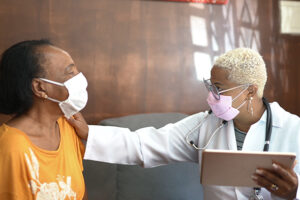Oncology
Chronic Myeloid Leukemia
Later-line Treatments in Chronic Myeloid Leukemia
Overview
Although great progress has been made in the treatment of chronic phase chronic myeloid leukemia (CML), many patients still experience intolerance or resistance to prior lines of therapy. At the 64th ASH Annual Meeting and Exposition, researchers shared their work to optimize later-line tyrosine kinase inhibitor (TKI) therapy in CML.
Following these presentations, featured expert Neil P. Shah, MD, PhD, was interviewed by Conference Reporter Editor-in-Chief Tom Iarocci, MD. Dr Shah’s clinical perspectives on these findings are presented here.
Neil P. Shah, MD, PhDEdward S. Ageno Distinguished Professorship in Hematology/Oncology |
|
“These data highlight an important unmet need for novel therapies with improved safety and efficacy profiles early in the patient’s treatment course.”
Despite the remarkable efficacy of ATP-competitive TKIs for chronic phase CML, approximately one-third of newly TKI-treated patients with CML switch to an alternative TKI over time due to TKI intolerance or resistance. Additionally, a small proportion of patients develop the BCR::ABL1 T315I mutation, which confers a worse prognosis.
At the ASH annual meeting, Nicolini et al conducted a retrospective chart review study focusing on patients with chronic phase CML who were treated with 3 or more lines of therapy or were harboring the T315I mutation (abstract 4343). Case records from between 2006 and 2021 were included in the analysis. The findings mirrored those of previous reports from other institutions, with researchers concluding that the most common reasons for treatment discontinuation in first, second, and third lines, including among patients with the T315I mutation, were intolerance and resistance. Further, earlier lines of treatment lasted less than 2 years in the third line and less than 1 year in those with the T315I mutation. These data highlight an important unmet need for novel therapies with improved safety and efficacy profiles early in the patient’s treatment course.
While clear guidelines exist for first-line treatment, the standard of care for patients receiving second-line therapy and beyond is less well defined. There are general recommendations, but the evidence base often precludes formalized structure to the guidance. Contemporary guidelines state that the definition of an acceptable response to third-, fourth-, or fifth-line treatment has not been formalized but that a BCR::ABL1 transcript level of greater than 1% or a cytogenetic response of less than complete (Ph+ >0%) are insufficient for optimal survival. TKI choice in this setting should be guided by the sensitivity profile of specific BCR::ABL1 kinase domain mutations, if possible, and, in particular, T315I. Additionally, allogeneic stem cell transplantation should be considered following a suboptimal response to multiple TKIs.
The phase 2 OPTIC trial evaluated the risk-benefit ratio for ponatinib at differing doses using a novel response-based dosing strategy in heavily pretreated patients with demonstrated TKI resistance or in patients with the T315I mutation after receiving prior TKI therapy. All 3 ponatinib dosing regimens demonstrated benefit in resistant patients, but a ponatinib starting dose of 45 mg per day with a reduction to 15 mg per day upon attainment of BCR::ABL1 IS results of 1% or lower resulted in the optimal risk-benefit ratio (abstract 620).
In abstract 3009, Apperley and colleagues presented the results of their post hoc analysis of long-term outcomes of patients in the OPTIC trial who reached landmark clinical responses (ie, ≤1%, >1%-≤10%, and >10% BCR::ABL1 IS by months 3, 6, and 12). Ponatinib demonstrated substantial activity among heavily pretreated, TKI-resistant patients with chronic phase CML. The attainment of 10% BCR::ABL1 IS or lower with ponatinib within 12 months was associated with improved long-term progression-free survival outcomes compared with the progression-free survival outcomes that were linked to remaining at greater than 10% BCR::ABL1 IS. These results support the clinical benefit of achieving molecular responses with ponatinib, especially achieving 10% BCR::ABL1 IS or lower within 1 year. It should be noted that follow-up is still quite short.
TKI dose optimization continues to be a major area of interest in CML research in general and, specifically, with regard to patients with chronic phase CML who were previously treated with 2 or more TKIs (≥third line). Asciminib is another agent that is being explored in this context, and the similarities in efficacy and safety between 80 mg once daily and 40 mg twice daily were among the items explored by Combes and colleagues (abstract 3023). Asciminib is a first-in-class BCR::ABL1 inhibitor that specifically targets the ABL myristoyl pocket and has the potential to overcome resistance/intolerance to US Food and Drug Administration–approved TKIs.
In the phase 3 open-label ASCEMBL study, 233 patients with chronic phase CML who were previously treated with 2 or more TKIs received asciminib 40 mg twice daily on an empty stomach or bosutinib 500 mg once daily. The major molecular response rate at 24 weeks was 25.5% with asciminib and 13.2% with bosutinib. The proportion of patients who experienced adverse events leading to treatment discontinuation was lower with asciminib than with bosutinib (5.8% vs 21.1%). The most common adverse events leading to treatment discontinuation included thrombocytopenia with asciminib and increased alanine aminotransferase with bosutinib. A caveat of this study is that the bosutinib dose of 500 mg daily, while consistent with the US Food and Drug Administration package insert for patients who have taken prior TKI therapy, is known to be associated with substantial toxicity, and this dose is rarely used clinically today.
At ASH 2022, the rationale behind exploring asciminib 80 mg once daily vs 40 mg twice daily was presented. Breccia et al shared their plans for the ASC4OPT study, which will investigate both asciminib 80 mg once daily and 40 mg twice daily in the third-line setting with an eye to optimal patient compliance (abstract 4334). Additionally, dose escalation of asciminib to 200 mg once daily will be explored in patients who fail to achieve a major molecular response at 48 or more weeks.
At the present time, guidance regarding the dose escalation of asciminib is not included in the package insert. It remains unclear whether the low dose of asciminib is adequate for all non-T315I mutations that confer resistance to ATP-competitive inhibitors, including mutations that reside in the P-loop and the P-loop–adjacent region, which are located at a considerable distance from the asciminib binding pocket (abstract 4323).
References
Apperley JF, Cortes JE, Jabbour E, et al. Molecular response of ≤10% BCR::ABL1IS is predictive of positive outcomes in treatment-resistant patients with chronic phase chronic myeloid leukemia (CP-CML) treated with ponatinib from the phase 2 OPTIC trial [abstract 3009]. Abstract presented at: 64th American Society of Hematology Annual Meeting and Exposition; December 10-13, 2022; New Orleans, LA.
Breccia M, Turkina A, Boquimpani C, et al. ASC4OPT: a phase 3b open-label optimization study of oral asciminib in chronic myelogenous leukemia in chronic phase previously treated with 2 or more tyrosine kinase inhibitors [abstract 4334]. Abstract presented at: 64th American Society of Hematology Annual Meeting and Exposition; December 10-13, 2022; New Orleans, LA.
ClinicalTrials.gov. Ponatinib in participants with resistant chronic phase chronic myeloid leukemia (CP-CML) to characterize the efficacy and safety of a range of doses (OPTIC). Updated January 13, 2022. Accessed December 21, 2022. https://clinicaltrials.gov/ct2/show/NCT02467270
Combes FP, Li YF, Sy SKB, et al. Justification for asciminib dosing in patients with Philadelphia chromosome-positive chronic myeloid leukemia (Ph+ CML-CP) with and without the T315I mutation [abstract 3023]. Abstract presented at: 64th American Society of Hematology Annual Meeting and Exposition; December 10-13, 2022; New Orleans, LA.
Cortes J, Apperley J, Lomaia E, et al. Ponatinib dose-ranging study in chronic-phase chronic myeloid leukemia: a randomized, open-label phase 2 clinical trial. Blood. 2021;138(21):2042-2050. doi:10.1182/blood.2021012082
Cortes JE, Deininger MW, Lomaia E, et al. Three-year update from the OPTIC trial: a dose-optimization study of 3 starting doses of ponatinib [abstract 620]. Abstract presented at: 64th American Society of Hematology Annual Meeting and Exposition; December 10-13, 2022; New Orleans, LA.
Hochhaus A, Baccarani M, Silver RT, et al. European LeukemiaNet 2020 recommendations for treating chronic myeloid leukemia. Leukemia. 2020;34(4):966-984. doi:10.1038/s41375-020-0776-2
Leyte-Vidal AM, Shah NP. Select P-loop mutants in BCR::ABL1 confer moderate to high degrees of resistance to asciminib [abstract 4323]. Abstract presented at: 64th American Society of Hematology Annual Meeting and Exposition; December 10-13, 2022; New Orleans, LA.
Nicolini FE, Huguet F, Huynh L, et al. Treatment patterns, tolerance, and clinical response of chronic phase chronic myeloid leukemia (CML-CP) patients (including those harboring the T315I mutation) experiencing multiple tyrosine kinase inhibitor failure: a multi-center retrospective chart review analysis [abstract 4343]. Abstract presented at: 64th American Society of Hematology Annual Meeting and Exposition; December 10-13, 2022; New Orleans, LA.
Réa D, Mauro MJ, Boquimpani C, et al. A phase 3, open-label, randomized study of asciminib, a STAMP inhibitor, vs bosutinib in CML after 2 or more prior TKIs. Blood. 2021;138(21):2031-2041. doi:10.1182/blood.2020009984
This information is brought to you by Engage Health Media and is not sponsored, endorsed, or accredited by the American Society of Hematology.











